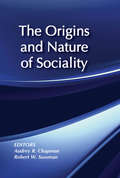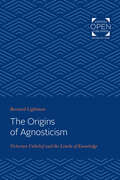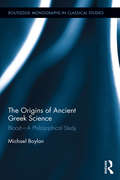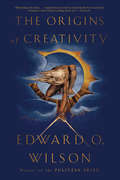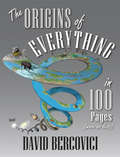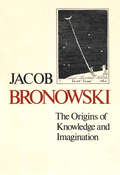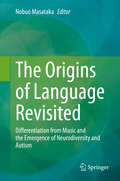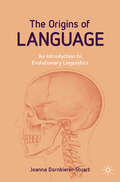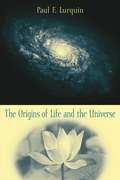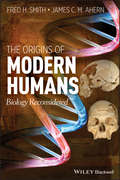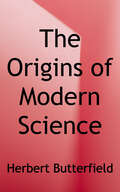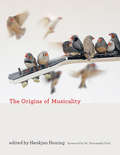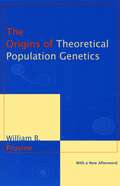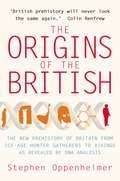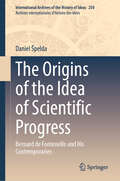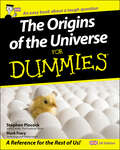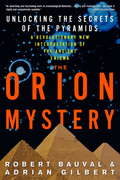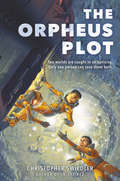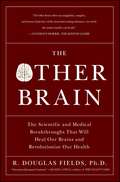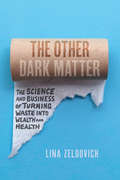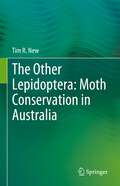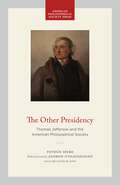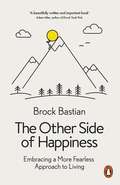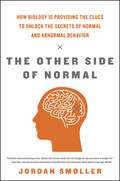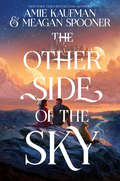- Table View
- List View
The Origins and Nature of Sociality
by Robert W. SussmanScientific developments have increasingly been transforming our understanding of the place of human beings in nature. The contributors to this book focus on the current status of research on sociality and the evolution of cooperative and altruistic behaviour in non-human and human primates. They examine questions related to the evolution, cultural viability, and hormonal underpinnings of human sociality in specific detail, and describe patterns of sociality that shed light on human social behaviour.
The Origins of Agnosticism: Victorian Unbelief and the Limits of Knowledge
by Bernard LightmanOriginally published in 1987. The Origins of Agnosticism provides a reinterpretation of agnosticism and its relationship to science. Professor Lightman examines the epistemological basis of agnostics' learned ignorance, studying their core claim that "God is unknowable." To address this question, he reconstructs the theory of knowledge posited by Thomas Henry Huxley and his network of agnostics. In doing so, Lightman argues that agnosticism was constructed on an epistemological foundation laid by Christian thought. In addition to undermining the continuity in the intellectual history of religious thought, Lightman exposes the religious origins of agnosticism.
The Origins of Ancient Greek Science: Blood—A Philosophical Study (Routledge Monographs in Classical Studies #22)
by Michael BoylanThis book examines the origins of ancient Greek science using the vehicles of blood, blood vessels, and the heart. Careful attention to biomedical writers in the ancient world, as well as to the philosophical and literary work of writers prior to the Hippocratic authors, produce an interesting story of how science progressed and the critical context in which important methodological questions were addressed. The end result is an account that arises from debates that are engaged in and "solved" by different writers. These stopping points form the foundation for Harvey and for modern philosophy of biology. Author Michael Boylan sets out the history of science as well as a critical evaluation based upon principles in the contemporary canon of the philosophy of science—particularly those dealing with the philosophy of biology.
The Origins of Creativity
by Edward O. WilsonAn eloquent exploration of creativity, The Origins of Creativity grapples with the question of how this uniquely human expression—so central to our identity as individuals and, collectively, as a species—came about and how it has manifested itself throughout the history of our species. In this profound and lyrical book, one of our most celebrated biologists offers a sweeping examination of the relationship between the humanities and the sciences: what they offer to each other, how they can be united, and where they still fall short. Both endeavours, Edward O. Wilson reveals, have their roots in human creativity—the defining trait of our species. Reflecting on the deepest origins of language, storytelling, and art, Wilson demonstrates how creativity began not ten thousand years ago, as we have long assumed, but over one hundred thousand years ago in the Paleolithic age. Chronicling this evolution of creativity from primate ancestors to humans, The Origins of Creativity shows how the humanities, spurred on by the invention of language, have played a largely unexamined role in defining our species. And in doing so, Wilson explores what we can learn about human nature from a surprising range of creative endeavors—the instinct to create gardens, the use of metaphors and irony in speech, and the power of music and song. Our achievements in science and the humanities, Wilson notes, make us uniquely advanced as a species, but also give us the potential to be supremely dangerous, most worryingly in our abuse of the planet. The humanities in particular suffer from a kind of anthropomorphism, encumbered by a belief that we are the only species among millions that seem to matter, yet Wilson optimistically reveals how researchers will have to address this parlous situation by pushing further into the realm of science, especially fields such as evolutionary biology, neuroscience, and anthropology. With eloquence and humanity, Wilson calls for a transformational "Third Enlightenment," in which the blending of these endeavors will give us a deeper understanding of the human condition and our crucial relationship with the natural world.
The Origins of Everything in 100 Pages (More or Less)
by David BercoviciCovering 13.8 billion years in some 100 pages, a concise, wryly intelligent history of everything, from the Big Bang to the advent of human civilization.With wonder, wit, and flair—and in record time and space—geophysicist David Bercovici explains how everything came to be everywhere, from the creation of stars and galaxies to the formation of Earth&’s atmosphere and oceans, to the origin of life and human civilization. Bercovici marries humor and legitimate scientific intrigue, rocketing readers across nearly fourteen billion years and making connections between the essential theories that give us our current understanding of topics as varied as particle physics, plate tectonics, and photosynthesis. Bercovici&’s unique literary endeavor is a treasure trove of real, compelling science and fascinating history, providing both science lovers and complete neophytes with an unforgettable introduction to the fields of cosmology, geology, genetics, climate science, human evolution, and more.&“For determined minds hoping for cogent, clever explanations for what we know of the history of the universe, Bercovici nails it.&” —Shelf Awareness &“Explaining life, the universe and everything in 100 pages may be a tall order, but physicist and volcano enthusiast Bercovici rises to the challenge. . . . Origins delivers on its promise—and (bonus!) it&’s even fun to read.&” —Discover&“Clear, concise, comprehensive, and written with verve and a sense of humor, The Origins of Everything is a delightful journey through time from the big bang to the present day.&” —Doug Macdougall, author of Frozen Earth
The Origins of Knowledge and Imagination
by Jacob BronowskiAdapted from a series of lectures by Bronowski that deals with one of the pivotal paradoxes that has plagued scientific thought.
The Origins of Language Revisited: Differentiation from Music and the Emergence of Neurodiversity and Autism
by Nobuo MasatakaThis book summarizes the latest research on the origins of language, with a focus on the process of evolution and differentiation of language. It provides an update on the earlier successful book, “The Origins of Language” edited by Nobuo Masataka and published in 2008, with new content on emerging topics.Drawing on the empirical evidence in each respective chapter, the editor presents a coherent account of how language evolved, how music differentiated from language, and how humans finally became neurodivergent as a species. Chapters on nonhuman primate communication reveal that the evolution of language required the neural rewiring of circuits that controlled vocalization. Language contributed not only to the differentiation of our conceptual ability but also to the differentiation of psychic functions of concepts, emotion, and behavior. It is noteworthy that a rudimentary form of syntax (regularity of call sequences) has emerged in nonhuman primates. The following chapters explain how music differentiated from language, whereas the pre-linguistic system, or the “prosodic protolanguage,” in nonhuman primates provided a precursor for both language and music. Readers will gain a new understanding of music as a rudimentary form of language that has been discarded in the course of evolution and its role in restoring the primordial synthesis in the human psyche. The discussion leads to an inspiring insight into autism and neurodiversity in humans. This thought-provoking and carefully presented book will appeal to a wide range of readers in linguistics, psychology, phonology, biology, anthropology and music.
The Origins of Language: An Introduction to Evolutionary Linguistics
by Joanna Dornbierer-StuartThis book offers an introduction to the multidisciplinary subject of evolutionary linguistics, which seeks to explain the biological origins of language and its subsequent development in humans. Roughly six million years ago, a branch of hominids from the forests of East Africa started to thrive in the drier environment created by the East African Rift System. A host of physical developments culminated in the brains of early humans increasing dramatically in size and cognitive power. Influenced by a unique and complex social organisation, communication signals became much more diverse and dependent on memory and learning mechanisms. But language is not only used to interact with our fellow beings. It is also closely connected to our thoughts. This makes language a biological, social, cultural and cognitive phenomenon all at once. What precise role did each of these aspects play in the emergence of language and how were they all coordinated to produce the most sophisticated communication system in the animal kingdom? The book aims to answer these questions and open up the fascinating world of evolutionary linguistics. It is not only aimed at scholars of linguistics, but also students from other disciplines (e.g., psychology, anthropology, evolutionary biology and cognitive science) who have an academic interest in language but may be approaching linguistics for the first time. In addition, the book should appeal to anyone with an interest in the workings of language in general, as well as advanced learners of English.
The Origins of Life and the Universe
by Paul F. LurquinThe Origins of Life and the Universe is the culmination of a university science professor's search for understanding and is based on his experiences teaching the fundamental issues of physics, chemistry, and biology in the classroom. What is life? Where did it come from? How can understanding the origins of life on Earth help us understand the origins of the universe, and vice versa? These are questions that have occupied us all. This is a book, then, about the beginning of things—of the universe, matter, stars, and planetary systems, and finally, of life itself—topics of profound interest that are rarely considered together. After surveying prescientific accounts of the origins of life, the book examines the concepts of modern physics and cosmology, in particular the two pillars of modern physics, relativity and quantum theory, and how they can be applied to the Big Bang model of the creation of the universe. The author then considers molecular genetics and DNA, the famed building block of life. In addition to assessing various hypotheses concerning the appearance of the first bacterial cells and their evolution into more complex eukaryotic cells, this section explains how "protocells" may have started a kind of integrated metabolism and how horizontal gene transfer may have speeded up evolution. Finally, the book discusses the possibility that life did not originate on planet Earth but first appeared on other solar planets, or perhaps in other star systems. How would such a possibility affect our understanding of the meaning of life, or of its ultimate fate in the universe? The book ends as it begins, with profound questions and penetrating answers, a state-of-the-art guide to unlocking the scientific mysteries of life and matter.
The Origins of Modern Humans
by Fred H. Smith James C. AhernThis update to the award-winning The Origins of Modern Humans: A World Survey of the Fossil Evidence covers the most accepted common theories concerning the emergence of modern Homo sapiens-adding fresh insight from top young scholars on the key new discoveries of the past 25 years.The Origins of Modern Humans: Biology Reconsidered allows field leaders to discuss and assess the assemblage of hominid fossil material in each region of the world during the Pleistocene epoch. It features new fossil and molecular evidence, such as the evolutionary inferences drawn from assessments of modern humans and large segments of the Neandertal genome. It also addresses the impact of digital imagery and the more sophisticated morphometrics that have entered the analytical fray since 1984.Beginning with a thoughtful introduction by the authors on modern human origins, the book offers such insightful chapter contributions as:Africa: The Cradle of Modern PeopleCrossroads of the Old World: Late Hominin Evolution in Western AsiaA River Runs through It: Modern Human Origins in East AsiaPerspectives on the Origins of Modern AustraliansModern Human Origins in Central EuropeThe Makers of the Early Upper Paleolithic in Western EurasiaNeandertal Craniofacial Growth and Development and Its Relevance for Modern Human OriginsEnergetics and the Origin of Modern HumansUnderstanding Human Cranial Variation in Light of Modern Human OriginsThe Relevance of Archaic Genomes to Modern Human OriginsThe Process of Modern Human Origins: The Evolutionary and Demographic Changes Giving Rise to Modern HumansThe Paleobiology of Modern Human EmergenceElegant and thought provoking, The Origins of Modern Humans: Biology Reconsidered is an ideal read for students, grad students, and professionals in human evolution and paleoanthropology.
The Origins of Modern Science
by Herbert ButterfieldFrom Simon & Schuster, Herbert Butterfield's The Origins of Modern Science chronicles the history of contemporary scientific theory. In The Origins of Modern Science Professor Herbert Butterfield argues that past scientific achievements cannot be viewed through the filter of 20th century eyes, but can be understood only in the historical and political context of an era.
The Origins of Musicality
by Henkjan HoningInterdisciplinary perspectives on the capacity to perceive, appreciate, and make music. Research shows that all humans have a predisposition for music, just as they do for language. All of us can perceive and enjoy music, even if we can't carry a tune and consider ourselves “unmusical.” This volume offers interdisciplinary perspectives on the capacity to perceive, appreciate, and make music. Scholars from biology, musicology, neurology, genetics, computer science, anthropology, psychology, and other fields consider what music is for and why every human culture has it; whether musicality is a uniquely human capacity; and what biological and cognitive mechanisms underlie it. Contributors outline a research program in musicality, and discuss issues in studying the evolution of music; consider principles, constraints, and theories of origins; review musicality from cross-cultural, cross-species, and cross-domain perspectives; discuss the computational modeling of animal song and creativity; and offer a historical context for the study of musicality. The volume aims to identify the basic neurocognitive mechanisms that constitute musicality (and effective ways to study these in human and nonhuman animals) and to develop a method for analyzing musical phenotypes that point to the biological basis of musicality. Contributors Jorge L. Armony, Judith Becker, Simon E. Fisher, W. Tecumseh Fitch, Bruno Gingras, Jessica Grahn, Yuko Hattori, Marisa Hoeschele, Henkjan Honing, David Huron, Dieuwke Hupkes, Yukiko Kikuchi, Julia Kursell, Marie-Élaine Lagrois, Hugo Merchant, Björn Merker, Iain Morley, Aniruddh D. Patel, Isabelle Peretz, Martin Rohrmeier, Constance Scharff, Carel ten Cate, Laurel J. Trainor, Sandra E. Trehub, Peter Tyack, Dominique Vuvan, Geraint Wiggins, Willem Zuidema
The Origins of Theoretical Population Genetics: With a New Afterword (Chicago History Of Science And Medicine Chsm (chup) Ser.)
by William B. ProvineTracing the development of population genetics through the writings of such luminaries as Darwin, Galton, Pearson, Fisher, Haldane, and Wright, William B. Provine sheds light on this complex field as well as its bearing on other branches of biology.
The Origins of the British: The New Prehistory of Britain
by Stephen Oppenheimer'British prehistory will never look the same again.' Professor Colin Renfrew, University of CambridgeStephen Oppenheimer's extraordinary scientific detective story combining genetics, linguistics, archaeology and historical record shatters the myths we have come to live by. It demonstrates that the Anglo-Saxon invasions contributed just a tiny fraction (5%) to the English gene pool. Two-thirds of the English people reveal an unbroken line of genetic descent from south-western Europeans arriving long before the first farmers. The bulk of the remaining third arrived between 7,000 and 3,000 years ago as part of long-term north-west European trade and immigration, especially from Scandinavia - and may have brought with them the earliest forms of English language.As for the Celts - the Irish, Scots and Welsh - history has traditionally placed their origins in Iron Age Central Europe. Oppenheimer's genetic synthesis tells a different story. There is indeed a deep divide between the English and the rest of the British. But as this book reveals the division is many thousands of years older than previously thought.'Be prepared to have all your cherished notions of English history and Britishness swept away' - Clive Gamble
The Origins of the Idea of Scientific Progress: Bernard de Fontenelle and His Contemporaries (International Archives of the History of Ideas Archives internationales d'histoire des idées #250)
by Daniel ŠpeldaThis volume offers a new interpretation of the genesis of the idea of scientific progress in early modern science and philosophy. The interpretation argues that the idea of scientific progress was not a historical category, but an epistemological one. The main thesis of the book posits that the idea of scientific progress was a methodological means of dealing with the contingency of nature. To illustrate the novelty of the idea, the individual chapters compare several features of Renaissance natural philosophy with a new regime of knowledge that included time as an inevitable factor of empirical research. The temporal regime of knowledge is illustrated by the work of Bernard de Fontenelle and his colleagues at the Académie des sciences in Paris at the end of the 17th century. The new interpretation remedies a gap in recent scholarship where the idea of scientific progress has been overlooked even though the early modern natural philosophers themselves used it to describe the nature of their research. The book places both well-known texts and less-studied documents in a new light, thus contributing to the lively and rich debate on the origins and nature of early modern science and philosophy. It is of interest to scholars studying the history of early modern philosophy and science.
The Origins of the Universe for Dummies
by Stephen Pincock Mark FraryDo you want to learn about the physical origin of the Universe, but don't have the rest of eternity to read up on it? Do you want to know what scientists know about where you and your planet came from, but without the science blinding you? 'Course you do - and who better than For Dummies to tackle the biggest, strangest and most wonderful question there is!The Origins of the Universe For Dummies covers:Early ideas about our universeModern cosmologyBig Bang theoryDark matter and gravityGalaxies and solar systemsLife on earthFinding life elsewhereThe Universe's forecast
The Orion Mystery
by Robert Bauval Adrian GilbertA revolutionary book that explains the most enigmatic and fascinating wonder of the ancient world: the Pyramids of Egypt. "[An] absorbing and fascinating work of archaeological detection...clearly and rivetingly told...the book is highly and compulsively readable."--London Sunday Times. 16-page black-and-white inserts.From the Trade Paperback edition.
The Orpheus Plot
by Christopher SwiedlerA rebellion in space pits one boy’s past against his future in this gripping adventure from the critically acclaimed author of In the Red! This out-of-this-world story about fighting for what’s right, chasing your dreams, and believing in yourself is perfect for fans of Kevin Emerson, Yoon Ha Lee, and D. J. MacHale.Lucas Adebayo grew up on a small mining ship in the asteroid belt, but wants to join the Navy and become the best pilot in the galaxy. The Navy has never accepted a Belter cadet before, but Lucas’s skills secure him a place on the training ship, the Orpheus.Life in the Navy couldn’t be more different than life in the Belt, and Lucas struggles to find his place. As a Belter, he’s an outsider among his peers; as a Navy cadet, he doesn’t quite fit in at home anymore, either. Lucas is caught between the worlds of his past and his future when a Belter rebellion puts everyone’s lives at risk. Only he can lead the way to peace.Praise for In the Red“It will leave you breathless.”—New York Times bestselling author D. J. MacHale“A non-stop, pulse-pounding adventure!”—Kevin Emerson, author of Last Day on Mars“Stunning descriptions and harrowing feats of survival.”—Booklist
The Other Brain: From Dementia to Schizophrenia, How New Discoveries about the Brain Are Revolutionizing Medicine and Science
by R. Douglas FieldsDespite everything that has been written about the brain, a potentially critical part of this vital organ has been overlooked—until now. The Other Brain examines the growing importance of glia, which make up approximately 85 percent of the cells in the brain, and the role they play in how the brain functions, malfunctions, and heals itself. Long neglected as little more than cerebral packing material, glia (meaning “glue”) are now known to regulate the flow of information between neurons and to repair the brain and spinal cord after injury and stroke. But scientists are also discovering that diseased and damaged glia play a significant role in psychiatric illnesses such as schizophrenia and depression, and in neurodegenerative diseases such as Parkinson’s and Alzheimer’s. Diseased glia cause brain cancer and multiple sclerosis and are linked to infectious diseases such as HIV and prion disease (mad cow disease, for example) and to chronic pain. The more we learn about these cells that make up the “other” brain, the more important they seem to be. Written by a neuroscientist who is a leader in glial research, The Other Brain gives readers a much more complete understanding of how the brain works and an intriguing look at potentially revolutionary developments in brain science and medicine.
The Other Dark Matter: The Science and Business of Turning Waste into Wealth and Health
by Lina ZeldovichGrossly ambitious and rooted in scientific scholarship, The Other Dark Matter shows how human excrement can be a life-saving, money-making resource—if we make better use of it. The average person produces about four hundred pounds of excrement a year. More than seven billion people live on this planet. Holy crap! Because of the diseases it spreads, we have learned to distance ourselves from our waste, but the long line of engineering marvels we’ve created to do so—from Roman sewage systems and medieval latrines to the immense, computerized treatment plants we use today—has also done considerable damage to the earth’s ecology. Now scientists tell us: we’ve been wasting our waste. When recycled correctly, this resource, cheap and widely available, can be converted into a sustainable energy source, act as an organic fertilizer, provide effective medicinal therapy for antibiotic-resistant bacterial infection, and much more. In clear and engaging prose that draws on her extensive research and interviews, Lina Zeldovich documents the massive redistribution of nutrients and sanitation inequities across the globe. She profiles the pioneers of poop upcycling, from startups in African villages to innovators in American cities that convert sewage into fertilizer, biogas, crude oil, and even life-saving medicine. She breaks taboos surrounding sewage disposal and shows how hygienic waste repurposing can help battle climate change, reduce acid rain, and eliminate toxic algal blooms. Ultimately, she implores us to use our innate organic power for the greater good. Don’t just sit there and let it go to waste.
The Other Lepidoptera: Moth Conservation in Australia
by Tim R. NewConservation interest in moths, by far the predominant components of Lepidoptera, lags far behind that for butterflies, for which conservation practice provides many well-established lessons for extension to their near relatives. The needs of moths are at least as great, but their greater richness and variety, and far poorer documentation of diversity and biology over much of the world contribute to this lack of attention. Australia’s rich moth fauna, largely endemic and of global interest, illustrates many of the problems of developing wider interest and support for moth conservation. Numerous species (perhaps half the total fauna) are undescribed, and many are ecological specialists in restricted and vulnerable environments over small parts of the continent. Establishing their conservation status and needs whilst accepting that foundation knowledge is highly incomplete and much species-focused conservation is impracticable provides complex problems in setting priorities, based largely on wider diversity and effective advocacy. Most Australian vegetation systems, from grassland to forest and from sea-level to alpine zones, have been eroded in extent and quality since European settlement, resulting in massive habitat changes for native insects and to leave fragmented (and commonly degraded) remnants in which moths and others may persist. Recent surveys continue to increase recorded moth richness, reveal local faunal peculiarities, and indicate how assemblage changes may mirror wider environmental changes. This book is an overview of advances in documenting and interpreting moth diversity and ecology, to show how information from better-studied moth faunas can help in planning conservation of Australia’s moths through measures such as understanding the moths themselves by increased surveys and study, the factors influencing their diversity and wellbeing, and how such threats may be countered through increased coordinated conservation interest, commitment and management.
The Other Presidency: Thomas Jefferson and the American Philosophical Society
by Patrick SperoIn The Other Presidency, Patrick Spero resurrects an overlooked but essential part of Thomas Jefferson’s life. For nearly seventeen years, Jefferson served as President of the American Philosophical Society (APS), the nation’s first learned society and one dedicated to promoting new research in the young republic, especially in the sciences. He did so while also serving as Vice President and President of the United States. As Spero shows in this short but important work, Jefferson used his various positions to solidify the Society’s foundation and, in turn, shape the course of American science. Through a deep dive into APS Archives and Jefferson’s papers, Spero demonstrates how the Society became a thoroughly Jeffersonian institution—that is, the APS, the largest and most powerful scientific body in the nation, advanced an agenda that comported with Jefferson’s own priorities. While Jefferson juggled affairs of state, he also remained deeply involved in the Society. In fact, the two complemented each other. He helped draft the institution’s first collection development policy, making clear the items and material he thought most important for the nation’s posterity. He also used his international network to introduce European intellectuals to the Society, and he called on these same networks to help build the Society’s collection. Jefferson himself received direct support from the Society to conduct his own research, including funding for an expedition with James Madison, and as President of the United States, he would often call on the APS and its members for advice. In short, Spero shows that Jefferson was integral to the development of the APS—and, perhaps more unexpectedly, the APS and the scientific community it fostered were integral to Jefferson and his vision for the young United States.A resource for students, history buffs, and Jefferson aficionados, the book includes a chronology of Thomas Jefferson's contributions to the APS, with references to major events in Jefferson's life.
The Other Side of Happiness: Embracing a More Fearless Approach to Living
by Dr. Brock Bastian'Required reading ... Brock Bastian expertly picks apart the fundamental idea that humans thrive when they approach pleasure and avoid pain, explaining why hardship sometimes yields richer lives that are laden with meaning, deep social connections, and unexpected bliss' Adam Alter, author of Drunk Tank Pink In today's culture, happiness has become the new marker of success, while hardships are viewed as personal weaknesses, or problems to be fixed. We increasingly try to eradicate pain through medication and by insulating ourselves from risk and offence, despite being the safest generation to have ever lived. Yet in his research, renowned social psychologist Brock Bastian has found that suffering and sadness are neither antithetical to happiness nor incidental to it: they are a necessary ingredient for emotional well-being.Drawing on psychology, neuroscience and internationally acclaimed findings from Bastian's own lab, The Other Side of Happiness encourages us to take a more fearless approach to living. The most thrilling moments of our lives are often balanced on a knife edge between pleasure and pain, whether it is finding your true love, holding your new-born for the first time, finishing a marathon or even plunging into an icy sea. This is because pain and the threat of loss quite literally increase our capacity for happiness, as Bastian reveals, making us stronger, more resilient, more connected to other people and more attuned to what truly matters. Pain even makes us more mindful, since in our darkest moments we are especially focused and aware of the world around us. Our addiction to positivity and the pursuit of pleasure is actually making us miserable. Brock Bastian shows that, without some pain, we have no real way to achieve and appreciate the kind of happiness that is true and transcendent.
The Other Side of Normal: How Biology Is Providing the Clues to Unlock the Secrets of Normal and Abnormal Behavior
by Jordan SmollerPsychiatry has ignored the normal. The focus on defining abnormal behavior has obscured what turns out to be a more fundamental question—how does the biology of the brain give rise to the mind, which in turn gives rise to everything we care about: thoughts, feelings, desires, and relationships? In The Other Side of Normal, Harvard psychiatrist Jordan Smoller shows us that understanding what the mind was designed to do in the first place demystifies mental illness and builds a new foundation for defining psychiatric disorders—from autism to depression. Smoller argues there are no bright lines between normal and abnormal. Psychiatric disorders are variations of the same brain systems that evolved to help us solve the challenges of everyday life. How do we become who we are? Smoller explains where our personalities come from, and how the temperaments we had as infants actually stay with us into adulthood. Why do we choose to date, love, and marry the people we do? Why do some of us form healthy relationships while others form unstable ones? Our relationships are shaped by the biology that drives two imperatives: maternal-child bonding and child-parent attachment. Along the way, Smoller tackles an even greater question—what do we mean by "normal"?—as he explores the puzzles behind the epidemics of multiple personalities and koro, the shocking phobia that one's penis is shrinking. He also looks at the controversial history of psychiatric classification and the explosive debates over how much early experiences influence our minds and to what degree genetics affect our temperaments, personalities, and emotional lives. Throughout this examination, Smoller explores the hidden sides of such questions as: How are trust and love rooted in biology? How much does sexual attraction stem from biology rather than culture? And what can the scientific study of normal behavior tell us about what it means to be human?Based on the author's groundbreaking research and personal experiences treating psychological disorders, The Other Side of Normal changes the way we think about the human condition.
The Other Side of the Sky
by Amie Kaufman Meagan SpoonerNew York Times bestselling author duo Amie Kaufman and Meagan Spooner have crafted a gripping tale of magic and logic, fate and choice, and a deadly love. Perfect for fans of Laini Taylor and Brandon Sanderson. Prince North’s home is in the sky, in a gleaming city held aloft by intricate engines, powered by technology. Nimh is the living goddess of her people on the Surface, responsible for providing answers, direction—hope. North’s and Nimh’s lives are entwined—though their hearts can never be. Linked by a terrifying prophecy and caught between duty and fate, they must choose between saving their people or succumbing to the bond that is forbidden between them.
